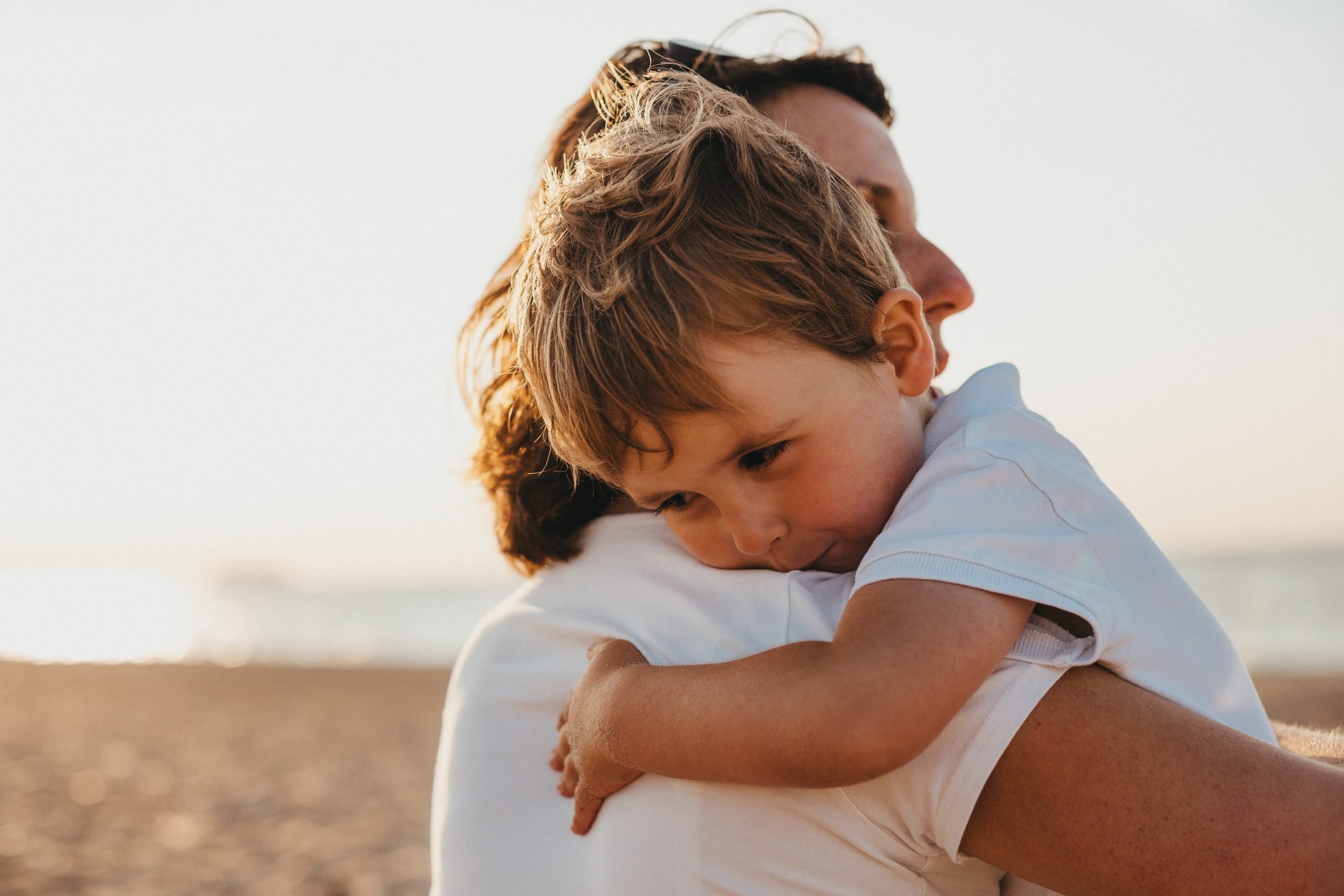Gentle parenting. Mindful parenting. Peaceful parenting. Positive parenting. Regular parenting is hard enough—do we have to put a label on it?

Look, I get it. At first, hearing about all the different ways to reference this popular parenting style just felt like a million new ways to remind me that I’m doing it wrong. I already feel like I’m screwing my kids up just fine on my own, so why not bring in the experts to really drive the point home?
But, as more days passed where I felt like my kids’ behavior was getting worse, like I couldn’t connect with them, like they hated me, like I was the worst mom to the worst kids…the more I realized that my go-to behavior (the reward-and-punishment style) was NOT working with my kids. More than that, it felt awful. None of us deserved to feel so defeated at the end of each day.
So, my own path toward being a more positive parent started in therapy. The more I talked with my therapist, the more I understood that the way we parent stems from our childhood. Our learned behaviors and triggers from how our parents raised us comes through in how we interact with our kids. The more I explored, the more I understood the importance of not just focusing on my child’s behavior, but focusing on the child behind the behavior.
Punish the behavior, not the emotion.
I started digging around the interwebs and social media. I wanted reliable/credible resources, but more than that, I wanted relatable resources. I wanted people who explained things in ways that made sense and resonated with me. I wanted layman’s terms. I wanted examples. I wanted realism. I wanted empathy. I wanted to understand the why as much as the how.
If I haven’t already lost you, let me start by giving a very basic explainer of the concept behind gentle/positive/mindful/peaceful parenting.
“Gentle parenting is an umbrella term for a parenting approach that aims to recognize and meet the needs of children in a gentler, more respectful way without using traditional, authoritarian-style discipline and punishments.” —Maggie Nick, MSW, therapist and founder of Parenting with Perspectacles
The gentle-parenting framework at Parenting With Perspectacles, for instance, focuses on raising children “who feel seen and loved” and “teaching parents how to allow kids to have their big feelings while setting and holding strong boundaries.”
Admittedly, lots of folks believe gentle parenting is a load of BS, mostly because on the surface, it can feel like there are no boundaries. “Kids need consequences for their actions,” or “Kids need to know who’s the boss” are popular schools of thought, which are not wrong.
But it’s important to understand that both things can be true. Parents can and should have boundaries, AND you can do that while still allowing kids to have their big feelings and teaching them that their feelings are valid.
“Meeting kids’ emotional needs helps them feel safe and secure, not entitled and spoiled… It is completely possible…to hold kids accountable for their behavior, teach them about the impact of their actions, while making them feel loved and supported.” — Maggie Nick
For example, the phrase “Go to your room!” is one we all often say in the midst of a tantrum or as an immediate response to poor behavior. But, telling a child to “go to their room” can be interpreted by kids as shame. It can teach a child to suppress their emotions and make them feel like their emotions aren’t allowed to share space with you.
If you say something instead like, “OK. I can see you’re angry, but it’s not OK to yell at me like that. We’re going to take a break from each other, and then we can talk about what to do next time you feel angry.” This removes the blame/shame, shows that you understand their emotion, validates the feeling, and names a boundary for how that emotion can show up.
I will caveat the rest of this post by saying it is NOT to make anyone feel like they are the world’s worst parent if you don’t adhere to this particular parenting style. (We are good at making ourselves feel that way all on our own.)
This is also not to say this is the ONLY effective parenting style. (You do what works for you and your kids).
This is definitely not to say that I am a perfect parent who follows this perfectly all day every day. I have many a moment when I decide that the gentle approach isn’t working and so we pivot. (Or I yell. We are all only human.)
This post is purely just a different perspective to consider, and sharing some resources that have resonated with me. There are many resources out there—these are just a few and simply a place to start.
- Dr. Becky – Dr. Becky Kennedy of “Good Inside” is my favorite resource. I follow her on Instagram, but she’s also on other socials, and has workshops, a podcast, books—so plenty of options based on the medium you prefer. Aside from her professional credentials, I love how she openly admits that she follows her own professional advice only about a third of the time. That’s why I trust her.
I first listened to Dr. Becky as a guest on an episode of the podcast, We Can Do Hard Things, with Glennon Doyle and Abby Wambach. Would highly recommend it as a starting point. It’s incredibly eye-opening and connected a lot of dots for me, personally. In the episode, Dr. Becky talks about:
- Why “I believe you” is one of the most important things to say to your kids and partners every day.
- Why our kids trigger us – and a fail-proof strategy to use when you’re triggered.
- Why “poorly-behaved kids” can be a sign of good parenting.
- How to break family cycles by rewiring the way we were raised.
In addition to that particular podcast, I like Dr. Becky’s Instagram because she uses real examples of how to tackle common situations using a more positive approach. While the exact phrasing may not be something I would say, I can always interpret it in a way that feels right for me and is still effective.
- Big Little Feelings: Run by two moms, one is a child therapist, while the other has a background in international maternal childhood education. Again, I follow them most closely on Instagram, but they also have a website and also offer courses. Their IG is full of bite-sized bits of everyday situations we all find ourselves in, as well as simple ways to rephrase things we all say on auto-pilot. For example, forcing kids to “go say sorry” when they do something like hit another child, and what we should try instead. In addition to the “how to” type content, I also love that these two moms make funny (relatable) reels, post hysterical memes, and generally seem like people I would hang out with.
- Maggie with Perspectacles: As mentioned above, Maggie Nick is the founder of Parenting with Perspectacles. Along with workshops, webinars and coaching, Maggie focuses on helping parents see their own struggles as opportunities to show their kids how to navigate life as messy, imperfect, wonderful humans who are also kind and confident. She focuses on keeping kids accountable but with love, not shame. On Instagram, Maggie’s reels speak to how to raise kids so that they don’t struggle with the things we did growing up. It’s all about breaking cycles and being better for our kids. She’s great, I think you’ll love her.
- Dr. Siggi: Last but not least, check out Dr. Siggi Cohen, a child development specialist. Another good follow on Instagram, Dr. Siggi is about empowering parents while also helping them feel less guilty. She shares helpful parenting scripts for how to change the message you want to deliver so that it actually resonates. She also shares common behavior patterns in kids and along with tips on what tends to be behind the behavior.
Again, I know this isn’t for everyone—it’s not for me all the time, either. I will say I have noticed significant improvement in my relationships with each of my children since I started using this approach. I’m more mindful of the words I use in heated moments and the impact those words may or may not convey. As a result, it feels like we are on the same time; they know I’m on their side, are better at naming their emotions, and working through better ways to deal with those feelings than screaming, crying, name-calling, hitting, etc.
For other parents who are trying this approach, I would love to hear if you have other resources to add to my list!










